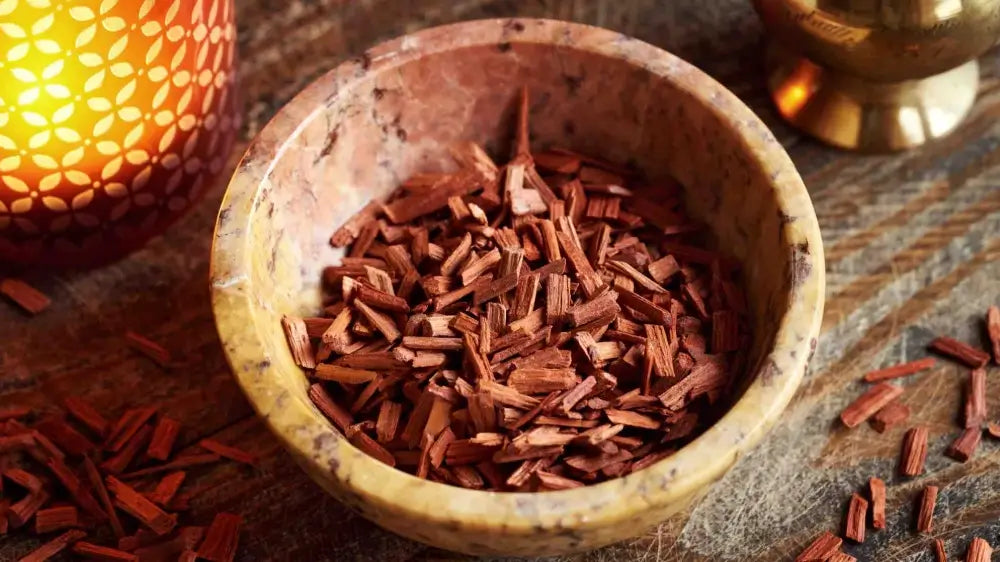
Sandalwood: A Sacred Scent
Share
Why Sandalwood is Timeless and Revered
Sandalwood is more than just a fragrant wood; it’s a symbol of spirituality, healing, and luxury that has captivated people across continents for thousands of years. With its creamy, woody aroma and multifaceted uses, it holds a sacred place in rituals, perfumes, and even medicine. But what makes sandalwood so special? Why has it remained a cherished treasure in our world? This article explores its unique charm, history, and benefits, giving you a glimpse into the magic of this revered scent.

The Origins and History of Sandalwood
Sandalwood, primarily sourced from the Santalum genus, has its roots in South Asia, particularly India. For centuries, it has been a prized resource in religious rituals, traditional medicine, and perfumery. Ancient texts from India, such as the Vedas, mention sandalwood as an essential component of sacred ceremonies, symbolizing purity and tranquility.
Historically, the trade of sandalwood was so significant that it shaped entire economies. Indian kings considered it a royal treasure, using it to build temples and carve idols. Beyond India, sandalwood found its way to China, the Middle East, and even Europe, where it was used in incense and luxury goods. The wood’s ability to retain its fragrance for decades only added to its value.
Today, sandalwood remains integral to many cultures. However, overharvesting has led to stricter regulations and cultivation efforts to preserve this precious resource for future generations.
The Unique Aroma: Why Sandalwood Smells Divine
Sandalwood’s fragrance is one of a kind—soft, woody, and slightly sweet. Unlike other aromatic woods, its scent deepens and mellows with time, making it a favorite in perfumes and incense.
The aroma is derived from the essential oil extracted from the heartwood of the sandalwood tree. This process takes years, as only mature trees yield the rich, creamy oil that defines sandalwood. The high concentration of santalol, a natural compound, is what gives sandalwood its distinctive scent and calming properties.
Beyond its fragrance, sandalwood oil has a unique ability to blend harmoniously with other scents. Whether paired with florals like jasmine or earthy notes like patchouli, it enhances and balances other ingredients, making it a cornerstone of luxury perfumery.
Sandalwood in Spirituality: A Sacred Connection
Sandalwood has been a spiritual cornerstone in many cultures. In Hinduism and Buddhism, it is burned as incense during prayers and meditations, believed to purify the air and elevate spiritual energy. Sandalwood paste is applied to the forehead in Hindu rituals, symbolizing devotion and inner peace.
In ancient Chinese traditions, sandalwood was used in temples to create a serene atmosphere for worship. Similarly, in Islamic cultures, sandalwood oil is added to incense burners for spiritual gatherings.
Its calming properties make it a favored tool for mindfulness practices today. Whether used in yoga studios or meditation rooms, sandalwood fosters a sense of grounding and connection.

Health Benefits of Sandalwood: More Than a Fragrance
Sandalwood is not just about its delightful aroma—it has numerous therapeutic benefits that make it a valued ingredient in traditional and modern medicine.
Skincare
Sandalwood oil is known for its anti-inflammatory and antimicrobial properties. It soothes irritated skin, reduces acne, and brightens the complexion. Many skincare products incorporate sandalwood to promote healthy, glowing skin.
Stress Relief
The calming effects of sandalwood extend to mental health. Diffusing its oil can help reduce anxiety, improve focus, and promote restful sleep.
Traditional Medicine
In Ayurveda, sandalwood is considered cooling and is used to treat fever, digestive issues, and even respiratory conditions. Modern studies suggest it may have potential as an anti-cancer agent, though more research is needed.
By incorporating sandalwood into your wellness routine, you’re not only enjoying its aroma but also reaping its holistic benefits.
How to Use Sandalwood: Practical Tips for Everyday Life
Sandalwood’s versatility means you can use it in multiple ways:
- Aromatherapy: Add a few drops of sandalwood oil to a diffuser for a calming atmosphere.
- Skincare: Mix sandalwood powder with rose water to create a soothing face mask.
- Meditation: Burn sandalwood incense or candles to enhance your practice.
- Perfume: Use sandalwood oil as a base note for DIY fragrances.
From beauty regimens to spiritual rituals, sandalwood fits seamlessly into your daily routine.

Sustainability and Ethical Sourcing of Sandalwood
The popularity of sandalwood has led to overharvesting, threatening its survival. To combat this, many countries now regulate its cultivation and trade. Ethical sourcing ensures the preservation of sandalwood forests while supporting local communities.
Common Questions About Sandalwood
1.Why is sandalwood so expensive?
The long maturation period (15-20 years) and high demand contribute to its cost. Ethical harvesting practices also add to the price.
2.Can sandalwood oil be used directly on the skin?
It’s best to dilute sandalwood oil with a carrier oil, like coconut or jojoba, before applying it to the skin to avoid irritation.
3.What are some alternatives to natural sandalwood?
Synthetic sandalwood or oils from similar aromatic woods, like cedarwood, can mimic the scent and are more affordable.
4.How can I tell if my sandalwood product is authentic?
Authentic sandalwood products have a deep, lingering aroma.
5.Is sandalwood safe for pets?
While sandalwood incense or diffusers are generally safe, avoid direct application of the oil on pets, as it may irritate their skin or cause allergic reactions.
The Timeless Charm of Sandalwood
Sandalwood is more than just a scent—it’s a legacy of spirituality, wellness, and luxury. From ancient rituals to modern skincare, its versatility and enduring appeal make it a cherished treasure. By embracing sustainable practices and appreciating its rich history, we can ensure that sandalwood continues to inspire and uplift us for generations to come. Let this sacred scent remind you of the simple yet profound beauty of nature.









